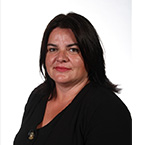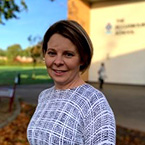The Ecclesbourne School operates a whole school approach to safeguarding and protecting children. Where safeguarding is concerned, we maintain an ethos of “it could happen here”. We recognise that everyone in the school has a role to play to keep children safe. This includes identifying concerns, sharing information, and taking prompt action. Safeguarding and child protection is incorporated in all relevant aspects of processes and policy development. All systems, processes and policies operate with the best interests of the child at their centre.
We ensure that all children are safeguarded while on or off school premises and are proactive about anticipating and managing risks that children face in the wider community and online. To support this the school assesses the risks and issues in the wider community when considering the well-being and safety of its learners. We recognise we have an important role to play in multi-agency safeguarding arrangements and contribute to multi-agency working as set out in Working Together to Safeguard Children (2018). As a relevant agency, the school understands its role within local safeguarding arrangements and operates in accordance with the Derby and Derbyshire Safeguarding Children multi-agency procedures, including the local criteria for action (known as the Threshold Document) and local protocols for assessment in Derby and Derbyshire.
We believe:
-
Safeguarding is everyone’s responsibility: all staff should play their full part in keeping children safe.
-
We will aim to protect children using national, local and school child protection procedures.
-
All children have the right to be protected from harm as defined by Article 3 in the UN Declaration on the Rights of the Child.
-
Children need to be safe and to feel safe in school in order to grow, learn and develop.
-
Schools can contribute to the promotion of children’s welfare and the prevention of harm.
-
Children need support which matches their individual needs, including those who may have experienced abuse.
-
In a multi-agency approach and so we work in partnership with other agencies in promoting safeguarding arrangements as set out by Working Together to Safeguard Children 2020.
-
In a child centred approach where students can clearly express their wishes, feelings and views.
-
That all staff should have a clear understanding regarding abuse and neglect in all forms; including how to identify, respond and report.
-
That all staff understand the process of managing allegations against staff including low level concerns.
-
Staff should feel confident that they can report all safeguarding concerns in the school and that these will be dealt with swiftly, appropriately and securely, following correct procedures and always maintaining the safety and wellbeing of the children involved.
Aims
We keep children safe by:
-
Providing safe environments, with secure access, where children can learn and develop.
-
Clarifying standards of behaviour for staff and students.
-
Identifying children who may need early help, and who are at risk of harm or who have been harmed. This can include, but is not limited to: neglect, abuse (including by other children), grooming or exploitation.
-
Introducing appropriate work within the curriculum;
-
Acting in the best interests of children to protect them online and offline, including when they are receiving remote education.
-
Ensuring staff understand the causes of harm.
-
Addressing concerns at the earliest possible stage.
-
Implementing child protection procedures.
-
Working in partnership with students, parents and other agencies.
Meet the Team
The safety and wellbeing of our children must always be at the heart of everything we do. Therefore, all adults in our school (staff, volunteers and Governors) are responsible for protecting the welfare of every child. If an adult has a concern about a child, then they must act. To say nothing is to do nothing. We will always strive to work together and do the basic things as well as possible. We will always aim to put the child first and make sure their voice is heard. From there we will always follow our procedures methodically and will ensure that dialogue and relationship building are central to securing the best academic and personal outcomes for our students.
Governors
Richard Lindop
Chair of Governors
Huw Lloyd
Safeguarding Governor
Suzanne Dixon
Safeguarding Governor
Leadership

James McNamara
Headteacher
DSL 
Clarissa Ourabi
Safeguarding Lead

Helen Green
Head of Inclusion
Heads of School
DSL 
Clarissa Ourabi
Head of Lower School
Deputy
DSL 
David Duncker-Brown
Head of Upper School
Deputy
DSL 
Hannah Weller
Head of Sixth Form
Heads of Year

Justin Weller
Head of Year 7

Oliver Quail
Head of Year 8

Emma Stott
Head of Year 9

Mark Sellers
Head of Year 10

Vicky Dodson
Head of Year 11

Sarah Hadwin
Head of Year 12

Penelope Bamber
Head of Year 13
Other Key Staff

Rachel Wiggins
SENDCO

Louise Monk
Pastoral Support Worker

Lisa Tanser
School Nurse
In the Curriculum
Students are taught about how to keep themselves safe during weekly Personal Development and Citizenship (PDC) lessons, Assemblies, Subject content and Drop down sessions through internal and external speakers. These cover key topics examples of which are:
-
Extremism and Radicalisation
-
Sexting and Sexual Harassment
-
Appreciating of the world at large including Equality, Diversity and Inclusion
-
Making safe choices
-
Online Safety
-
Healthy relationships/friendships
-
Drug and alcohol use including vapes
-
Upstander Bystander
-
Gambling
Details and curriculum content are available below:
Policies
Student Leadership
At The Ecclesbourne School, we strongly believe that young people working in collaboration with staff are able to make a difference to the experiences that students have at our school. We consult the student body on areas such as policy development, taught safeguarding in the curriculum, behaviour sanctions and rewards and how to deal with discriminatory and bullying issues.
Our student leaders represent the views of the student boy at Strategic Leadership Meetings, Governors meetings and at faculty reviews and are then able to feedback to the whole school. We also take whole school student feedback via questionnaires and student panels and use these results to inform decision making. Student leadership posts are highly contested and we ensure that leaders are representative of all areas of the school from Year 7 to Year 13.
Below are the key student leadership roles in school;
-
House Captains
-
Sixth form Prefects
-
Student Council
-
Wellbeing Ambassadors
-
Anti-Bullying Ambassadors
-
Feminista Group
-
Diversity Group
External Information/Support
Guidance
Support Services/ Advice